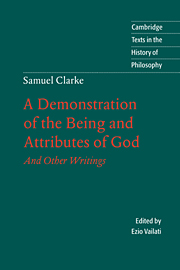Book contents
- Frontmatter
- Contents
- Acknowledgments
- List of abbreviations
- Introduction
- Chronology
- Further reading
- Note on the text
- A Demonstration of the Being and Attributes of God
- Other writings
- I Several Letters to the Reverend Dr. Clarke
- II The Answer to a Sixth Letter
- III The Answer to a Seventh Letter
- IV Letters to Dr. Clarke concerning Liberty and Necessity
- V From Remarks Upon a Book
- VI From Clarke's Sermons on Several Subjects
- VII From A Discourse concerning the Unchangeable Obligations of Natural Religion
- VIII From Four Defences of a Letter to Mr. Dodwell
- IX From A Collection of Papers which passed between the late learned Mr. Leibniz and Dr. Clarke
- Index
- Cambridge Texts in the History of Philosophy
V - From Remarks Upon a Book
Published online by Cambridge University Press: 07 January 2010
- Frontmatter
- Contents
- Acknowledgments
- List of abbreviations
- Introduction
- Chronology
- Further reading
- Note on the text
- A Demonstration of the Being and Attributes of God
- Other writings
- I Several Letters to the Reverend Dr. Clarke
- II The Answer to a Sixth Letter
- III The Answer to a Seventh Letter
- IV Letters to Dr. Clarke concerning Liberty and Necessity
- V From Remarks Upon a Book
- VI From Clarke's Sermons on Several Subjects
- VII From A Discourse concerning the Unchangeable Obligations of Natural Religion
- VIII From Four Defences of a Letter to Mr. Dodwell
- IX From A Collection of Papers which passed between the late learned Mr. Leibniz and Dr. Clarke
- Index
- Cambridge Texts in the History of Philosophy
Summary
[Editor's Note: The author Clarke criticized was Anthony Collins (1676–1729), a free-thinker leaning toward materialism who was greatly influenced by Locke. Collins' book, which denied freedom of the will, was published in 1716, Clarke's review, which contains a very clear exposition of his theory of agent causation, a year later. This selection should be read in conjunction with supplementary text iv. For ease of reading, I have eliminated Clarke's copious page references to Collins' book. The text is from Wiv, 721–5.]
In a book lately published, entitled A Philosophical Enquiry Concerning Human Liberty, the author [Anthony Collins] proposes six distinct arguments to prove that there neither is nor can be any liberty in human actions. The arguments he offers, have, I think, been already in great measure obviated in the papers which lately passed between me and the learned Mr. Leibniz. Yet, because some of them seem to be placed in such a light as may possibly deceive unwary persons whose thoughts have not been much conversant upon so nice a subject, I thought it not improper to set down particularly such brief remarks as might be sufficient to lay open to an intelligent reader the fallacy of the whole book.
- Type
- Chapter
- Information
- Samuel Clarke: A Demonstration of the Being and Attributes of GodAnd Other Writings, pp. 132 - 137Publisher: Cambridge University PressPrint publication year: 1998

